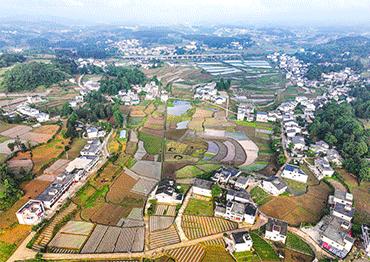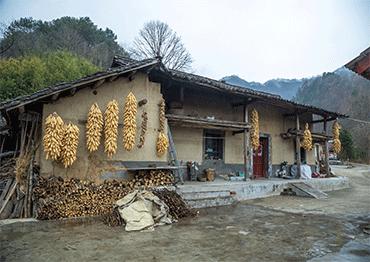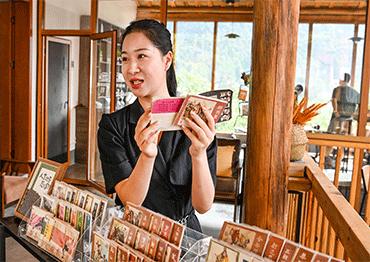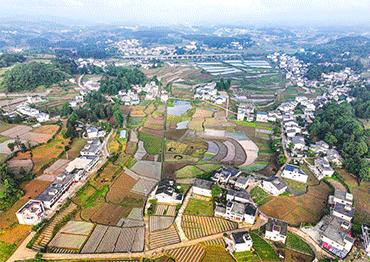New household registration policies are expected to boost two-way migrations between rural and urban areas in the process of urbanization and rural revitalization

An aerial view of Haozhi Village, Guizhou Province, May 13, 2024 shows plots of land that are distributed to legal village dwellers (Photo by VCG)
A new policy announced in the central province of Hunan allows urban migrants to transfer their household registration, known as a hukou, back to their villages of origin, making it easier for people to move according to their life or economic needs.
Experts said the change is long overdue, one that will “rectify the previous irrationality” in an anachronistic system that sets up bureaucratic barriers preventing people from living in a place that suits their current situation. It will also help boost rural economic development and revitalization.
A hukou is an all-important document that designates where the holder can legally reside and take advantage of the benefits that come with it, including many publicly funded services. When the system was set up in the 1950s, it classed people into rural or urban dwellers, a divide which persists today.
On March 26, Hunan Province announced that people who had moved their hukou from rural to urban areas after February 3, 2016, when the province abolished the distinction between an agricultural and non-agricultural hukou, are allowed to transfer their hukou back to rural areas. It loosens the criteria for people to move their official residence, even if they no longer have family in their home village, and allows people who still own a family property to transfer their hukou to that location.
Before that, the transfer of a hukou to a rural area was only made possible in cases such as spousal reunification, the reunification of minor children, divorce, and college students and veterans returning home.
The rapidly developing rural economy in some areas is a pull factor for reverse migration. But as the rural hukou involves rights and interests designed for rural areas, mainly involving land, conditions for hukou return have been stringent.
While Hunan introduced the policy in 2020, it did little to publicize it. This time, the move aroused fierce debate, as people discussed why conditions to return to rural areas were being loosened. Hunan is not alone, as in recent years, Jiangsu, Zhejiang and Shandong provinces have put forward similar policies.
Xia Zhuzhi, an associate professor with School of Sociology at Wuhan University, noted that this relaxation in the rules will allow people greater choice about where they live, especially if they regret their decision.
Reverse Situation
Three or four decades ago, no one would have imagined an agricultural hukou would be popular. During the rigid planned economy, people were treated enormously differently according to whether they had rural or urban residential status. An urban hukou meant access to a lot of social benefits like education, employment, food services, retirement allowances, healthcare and other public services. People with a rural hukou often had to fend for themselves and were labeled as farmers, living off what they could grow in villages that lacked healthcare or educational facilities. At the time, it was the central government’s plan to subsidize industrialization with agriculture and maintain social stability.
Those with an urban hukou had much more job choice and freedom of movement. A military veteran with an urban hukou could get a job in a factory or public institution. But one with a rural hukou had to return to their village and work in agriculture. After middle school graduation, urban citizens could work in factories, but those with a rural hukou had to farm. It was the dream of millions of rural people to get a non-agricultural hukou and live life with a guarantee of an “iron rice bowl,” where every daily need was provided by the workplace, including housing and food.
This vast gap in benefits led to a huge illegal trade in selling urban hukou in the 1980s and 1990s. In 1992, the Ministry of Public Security tried to crack down on the practice, noting that some counties and cities openly sold non-agricultural hukou, claiming the money raised was funding construction or hastening reform and opening-up. Those who fled the villages often left their land untended or to be absorbed by the village collective, Xia said.
The situation began reversing around the mid-2000s, when some rural areas, especially in the prosperous south and east, started to develop. In 2006, the central government abolished agricultural tax, making farming more profitable. There has been even more emphasis on rural development in the past few years, due to poverty alleviation and rural revitalization schemes. It means an urban hukou is not as attractive as it once was.
“We found in our research that many villagers hoped to get benefits by buying an urban hukou, but it didn’t always work out. And then it was hard to reassign their hukou to their village,” Xia said.
As urban life becomes more expensive and opportunities arise in the countryside, many rural residents want to get back their share of the village land, either to farm or to build houses on. In eastern provinces like Jiangsu and Zhejiang that have prosperous hinterlands, owning plots of land is lucrative.
For a long time, the transfer of hukou was a one-way flow. Joining the army or going to a city college means transferring one’s hukou also, although this is likely a temporary arrangement. Just attending university in a big city like Beijing does not guarantee a Beijing hukou, which opens up access to city services and benefits. Urban graduates often scramble to find a job that offers a hukou if they want to stay in the city.
As China pushed urbanization along with land consolidation in the countryside, more rural dwellers were encouraged to transfer their hukou to cities, if they qualified through a certain number of years of residency or had bought a property. But doing the journey in reverse is hard, even for veterans and college graduates.
Chen Gang, a man from Henan Province, told NewsChina that his hukou was transferred to urban status in Fujian Province where he started college in 2003. But even though he later moved home, he retained an urban status, meaning he no longer benefits from village entitlements, such as land. “The policy takes it for granted that once you leave for college you will get a job and never need to go back, as happened decades ago to people with non-agricultural hukou. But times have changed. The non-agricultural hukou is of no value at all,” Chen said.
In many places the transfer policies are vague. There are tedious formalities, as well as some prohibitive restrictions and requirements.
Zheng Fengtian, director of the Rural Development Research Institute at the Renmin University of China said that in the past, people would have to use their connections to get registered back in their village. “The new policy establishes the grounds for transfer and it will make the process easier,” Zheng said.
The current policy is in tune with the trend of rural-urban integration and gives people the right to choose between living in urban and rural areas. “It’s progress, or an adjustment for the previous irrationality,” Zheng said.

A rural house in Hanzhong, Shaanxi Province is adorned with bunches of corn cobs, February 20, 2023 (Photo by VCG)
Remaining Hurdles
The implementation of the policies is difficult, as being a village member involves interests such as welfare dividends and land.
Several interviewed village leaders and some people who want to transfer their hukou to rural areas admitted there had been some resistance due to clashes of interests.
In some rural regions where there has been large-scale demolition and land acquisition for developments, villagers with a hukou receive annual dividends according to their share of the previous farmland, which could be in the hundreds or thousands of yuan. Villagers may also be allocated apartments in urban developments after demolitions. This explains why villagers are reluctant to share these benefits with people they consider outsiders.
An official with the public security bureau of Ningxiang, Hunan Province, told NewsChina that while they can do the required paperwork to transfer the hukou, any benefits they get later will depend on the village.
A man surnamed Luo working in Hengyang, Hunan, said many villagers had bought urban apartments to get a hukou so their children could attend better public schools. He did the same. “I asked once whether it would be easy to get the hukou back. Our village leader told me that the people [who left] didn’t contribute to village affairs such as road building after they moved. They need to get the nod from 80 percent of the villagers if they want to enjoy some welfare from the village,” Luo said.
Han Xia (pseudonym), a village official from Zibo, Shandong Province, told NewsChina that even though the village committee allows people to transfer their hukou back, they do not get the same benefits as other villagers. “They moved to cities for many years and did nothing for the village. The villagers won’t allow them to enjoy the benefits either,” Han said.
The village committee usually does not make things difficult for people who want to come back. But the committee asks them to sign an agreement to voluntarily waive the benefits, or their request will be rejected, Han said.
Han’s parents’ village is very developed, so the benefits are handsome too. The village rejects any request to transfer a hukou. “Doesn’t matter what the policy is, they can’t get their hukou back if the village refuses,” Han said.
It is more complicated when it comes to land distribution. Under the household responsibility system, land is collectively owned and households are land contractors. Residents are given land to farm for a term of 30 years. Starting in the 1980s, with several rounds of land contracts since then, some are due to expire from 2025. The new round of village land contracts will be adjusted based on the permanent population.
Xia Zhuzhi said that under a person’s existing hukou, rural or urban, the village will not take back the land as long as the 30-year contract has not expired. But a non-resident villager could see their land taken away and redistributed once their contract expires.
Many want to get their rural hukou back as the date to redistribute village land approaches, Han said. When Han’s village next needs to redistribute land in a few years, there might be problems. “It’s unclear yet how the land contract will be adjusted. Some chose to transfer their hukou to prepare for the upcoming change,” Han said.
Xia told NewsChina that many people want a rural hukou so they can legally inherit their ancestral residential land. While a property built on the land allocated to them is not connected to a hukou, only members of the village collective are granted the right of use for residential land.
“So if they get the rural hukou for the village, they can inherit both the right to the residential land and property on it legally,” Xia said.
This is why decision makers need to provide practical solutions to address the demands of returning villagers for property and farmland, while ensuring the interests of existing villagers are not harmed, several interviewed analysts noted.

Tan Yue, a hostel owner in Huoshaodian Town, Shaanxi Province, shows her guests some comic strips she collected in her childhood, July 20, 2023. She returned to her hometown in 2022, 10 years after graduating from college, to start up the business because of a local revitalization scheme (Photo by VCG)
Two-way Flow
In its new policy published both in 2020 and in March, Hunan Province stated that only people who transferred their hukou from rural to urban areas after February 3, 2016 are allowed to move it back.
Xia said this is to limit numbers. “So many people moved to cities in the 1980s and 1990s. If there’s no time limit, there would be too many people. Villages might not be able to cope and it could cause conflicts or disputes in rural areas,” Xia said.
These policies are not intended to encourage city people to go back to rural areas or open up farms to urban residents, nor is it de-urbanization, Xia pointed out. “It’s a relaxation in local policy that allows farmers who moved their hukou to urban areas but now have regrets,” Xia said.
Meanwhile, the process of urbanization continues. In 2023, China’s urbanization rate reached 66.16 percent, although the country still needs to catch up on developed economies with an average of 80 percent urbanized.
Yet as China is also pursuing a policy of rural revitalization, people are needed to build and run family farms and cooperatives. Some former rural residents still have a strong attachment to their hometown. Their return will benefit countryside development, Zheng Fengtian of the Renmin University of China, said.
The demand for two-way flow between rural and urban areas is likely to continue, noted Lu Ming, a professor at Shanghai Jiao Tong University’s Antai College. The previous household registration design was not good for ruralurban migration, so if the hukou system is to be reformed, it should try to solve problems on both ends to boost development both in rural and urban areas.
Due to fallout from the global financial crisis in 2008, millions of rural Chinese migrant workers went home. Their rural land holdings provided a crucial buffer as they were not covered by the urban social security system.
Lu suggested that the government should continue to create conditions to adapt to the process of urbanization, such as building more social housing for workers, and decouple the need for a local hukou if people want to live and develop enterprises in rural areas, allowing people to choose to live where they have opportunities.
The government is paying more attention to the interests of farmers who have moved their hukou to urban areas. In February, Zhu Weidong, vice director of the Office of the Central Commission for Financial and Economic Affairs, a top financial and economic policymaking body, said at a press conference held by the State Council that the right to their farmland, residential land and collective income distribution has to be secured before they permanently settle in cities.
Zhu said that although China is going through rapid urbanization, the process is continual. “It will take a long time for rural dwellers to eventually settle in cities. Before they take root in cities, we shouldn’t burn their bridges to return,” Zhu said.

 Old Version
Old Version


